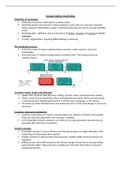Samenvatting marketing
Definition of marketing
Marketing is about the satisfying the customer needs.
Marketing (book)= the process by which companies create value for customers and build
strong customer relationships in order to capture greater long-run returns and stay loyal(buy
more).
Marketing (ppt) = Definition: the art and science of finding, retaining and growing profitable
customers.
S.T.(d)P.: segmentation, targeting,(differentiating), positioning.
The marketing process
In the first 4 steps it’s about understanding consumers, create customer value and
relationships.
In the final step, it’s about creating superior customer value. That creates long-term
customer equity.
Customer needs, wants and demands
Needs: basic physical needs like food, clothing, warmth, safety. Social needs like relaxion.
Wants: needs that are shaped by culture and individual personality. Wants are how people
communicate their needs(hungry(need) in VS they want hamburger, in NL cheese).
Demands: you have unlimited wants, but limited resources. If they have bought it, it become
demands.
Customer value and satisfaction
Customer expectations are based on buying experience, opinions of friends. If the supplier
meets the customer expectation, the customer is satisfied.
In the hospitality industry customers can easily set a to high expectation because they can
only judge after they have consumed it.
Market concepts
Production concept: it’s about efficiency and that the products are highly affordable. They
mostly forget to think about the customer.
Product concept: it’s about product improvements. Product quality and improvement are
important.
Selling concept: they think consumers will not buy enough so they have to do large selling
and promotion effort. They want every possible sale. They don’t think about a long-term
relationship(tell sell).
, Marketing concept: the producers want to deliver the desired satisfaction. They focus on
needs and want a long-term customer relationship based on customer value and satisfaction.
They only supply, if there is demand.
Social marketing concept: what’s best for it’s consumers in the long run? It’s about
sustainable marketing, socially and environmentally responsible.
- a balance between consumer wants, company profits and society’s interests
customer relationship management (CRM)
CRM = process of building and maintaining profitable customer relationships by delivering
superior customer value and satisfaction and create customer delight. The main aim is to
create customer equity(explanation later!).
They for example give room upgrades, patronage discounts.
Capturing value from customers
The last step of the market process is about superior customer value so the clients stay loyal
and buy more in a greater long-run returns.
Customer loyalty and retention(behoud): a good CRM creates customer delight(klant
tevredenheid) that remain loyal and talk to others about that company. Losing a customer
means losing a lot of sales because of the lifetime value(LTV).
Growing share of customer: a good CRM can create a increase of the share of customers(=?) .
Customer equity = the total combined customer LTV’s of all company’s current and potential.
The more loyal the firm’s profitable customers, the higher it’s customer equity. Equity
suggests the future.
Characteristics of service marketing
Intangibility: products can’t been seen, tasted, felt before they are purchased(restaurant
customer will not know how the food is until they have tasted it). The goal is to create
experiences that results in positive experiences.
- Providing tangible evidence: virtual tours, pictures, social media. Well groomed and
dressed, uniforms.
Inseparability: service that can’t be separated(teachers and children)
Variability: service depends on who, where, how(new employee, candles)
Perishability: service can’t be used later(hotel room, bike tours)
Three types of marketing
, Internal marketing: train and motivate it’s customer-contract employees and all the
supporting service people to work as a team to provide customer satisfaction. For the firm to
deliver consistently high service quality.
External marketing: with customers. Partnership
Interactive marketing: perceived service quality depends heavily on the quality of the buyer-
seller interaction during the service encounter.
Consumer buying behavior
Because of globalization there is a fiercely competitive international market which invest in
research that will reveal what customers want to buy, locations, amenities, how and what
they buy.
The marketing stimuli and the consumer response.
You are high involved when you have to pay a lot. When it is a expensive
Habitual buying is something like doing groceries, or buying only coca cola. Variety seeking
behavior is more like going to a restaurant.
Affecting consumer behavior
Cultural factor = the basic values, perceptions, wants and behaviors that a person learns in a
society. It’s expressed through tangible items such as food, architecture and clothing.
Subculture: it’s about nationalities, religions, racial groups and geographic regions. Every
subculture has it’s own preferences and behavior.






